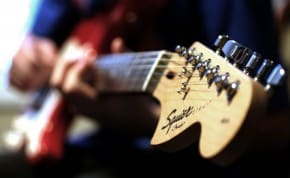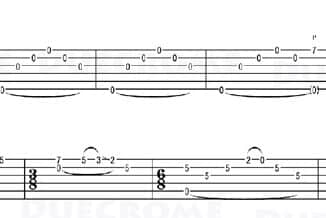
As a guitar instructor, I routinely deal with students trying to learn songs they want to play. After all, that’s the whole point of this thing of ours, right? The thing that I notice over and over, however, is the increasing dependence of most students on some sort of online tab website to provide the details on how a given song is played, rather than learning the song in the time-honored play-along-with-the-record ear-based method.
When I talk to students about this, they seem to feel that guitar tabs are the only way they can learn a new song, and are reluctant to use the play-along method. This causes me to worry about their development and overall musicianship, as pickers do not live by tab alone. In this spirit, I have decided to make this, my latest Fight Club piece, about this very topic in hopes of shedding some light on how and why we learn the tunes that we play and the benefits and drawbacks of each method.
First of all, let me say that there is nothing inherently evil about reading guitar tabs, online or otherwise, or standard notation, for that matter. I learned to read notes from my very first lesson in third grade and tabs a bit later and my reading skills have been very helpful in many musical situations over the years.
The problem comes when students depend entirely on guitar tabs and never develop the skills needed to interact with the music they are learning directly, rather than through someone else’s interpretation of it. You see, a tab is as good as the person who did it. In a published transcription book, the tabs are usually done by professional transcribers who have a high black belt-level grasp of music and are normally pretty close to right.
Online Guitar Tabs
 Online guitar tabs, though, are as good as the 12-year-old who did them in his bedroom and are often ragingly incorrect. Also, it’s easy to find many different tabs of the same song and to discover that they are all different from each other, with no real way to know which the correct version is. The main reason given for using them by students is (of course) “it’s easy.” Easy, however, is not what we are always looking for and, while a somewhat correct online tab may let a beginning student approximate a song quickly, those who use guitar tabs as their only way of learning are missing out on the skill development and ear training that the play-along method provides.
Online guitar tabs, though, are as good as the 12-year-old who did them in his bedroom and are often ragingly incorrect. Also, it’s easy to find many different tabs of the same song and to discover that they are all different from each other, with no real way to know which the correct version is. The main reason given for using them by students is (of course) “it’s easy.” Easy, however, is not what we are always looking for and, while a somewhat correct online tab may let a beginning student approximate a song quickly, those who use guitar tabs as their only way of learning are missing out on the skill development and ear training that the play-along method provides.
Playing Guitar By Ear
Playing by ear, in contrast, is often one of the hardest things for a student to learn to do, mostly because it can’t really be taught. It is a total learn-by-doing experience, and that is its whole benefit. It does, though, pay huge rewards to those that really work it and puts them on the same path that their old-school guitar heroes took. The gains made by ear playing are better knowledge of where the sounds are on the guitar, the ability to recognize and identify components of the music we hear, and the many musical discoveries made on the way to sounding things out.
These abilities and discoveries are major building blocks of a players’ individual style and cannot be gained any other way. Also, music is sound (duh!) and sound is a living, breathing thing, especially when we play live. If you skipped over the ear training portion of a musician’s development, it will be difficult for you to follow if your band deviates even slightly from the ink-and-paper script you memorized.
A player with a skilled ear can hear things change, know what they changed to, and follow them wherever they go. The downside to this way of learning is that it is more difficult and time-consuming. It requires a lot of butt-in-the-chair time to get better at it and many students are unwilling to put that time in. You know what? No guts, no glory. It’s kind of like playing football: you have to put in the time and take the hard knocks to get to where you want to be.
Ultimately, an expert musician knows and uses many different methods to learn songs, picking the right one for the job at hand. Reading and listening are both important and the only person who will tell you that one of them isn’t is someone who can’t do it.
That said, if I had to pick one to use for the rest of my musical life, it would be ear playing, hands down. Ear playing allows for direct interaction with the piece of music at hand, with no other interpreter involved, and the skills developed by doing it are worth the struggles they require to possess. After all, that’s the whole point of this thing of ours, right? Most of us who want to learn how to play guitar do it to play the songs we love. Sorry to say, but, in this Fight Club, tab just got its butt kicked.




I’m one of those people who came to rely totally on tabs and it took a few years before I figured out just how much I was stifling my development as a player. Sure, I can eventually nail a lot of tabs with enough practice, but when trying to jam with friends and fall in with a good groove from the rhythm section, I’m at a complete loss. This is the difference between playing by ear and using tabs. I’ve since taken to just turning on the radio or pandora and playing along with whatever comes up, it’s a great way to practice as it keeps me on my toes and keeps the material I’m learning fresh and interesting. It’s not the only way I practice but it’s in the arsenal and since I’ve begun doing it I’m seeing benefits in my own creativity when it comes to improvisation and finding my way around the fretboard without referencing a scale chart.
I still play along with a tab every now and then, but I’ve gone from 90% tabs and 10% ear to 90% ear and 10% tabs. Usually I’ll just reference them to see if I can find a different approach to something I’ve already learned by ear, which is one of the benefits that they offer.
Think of all the $ you will save on buying sheet music!
I agree, it is very cool to just be able to hear a tune and then immediatly just play it. Knowing where to find the different sounds your fret board offers, without using tabs or sheet music, is a big benefit.
It would be interesting to know what famous musicians just played by ear.